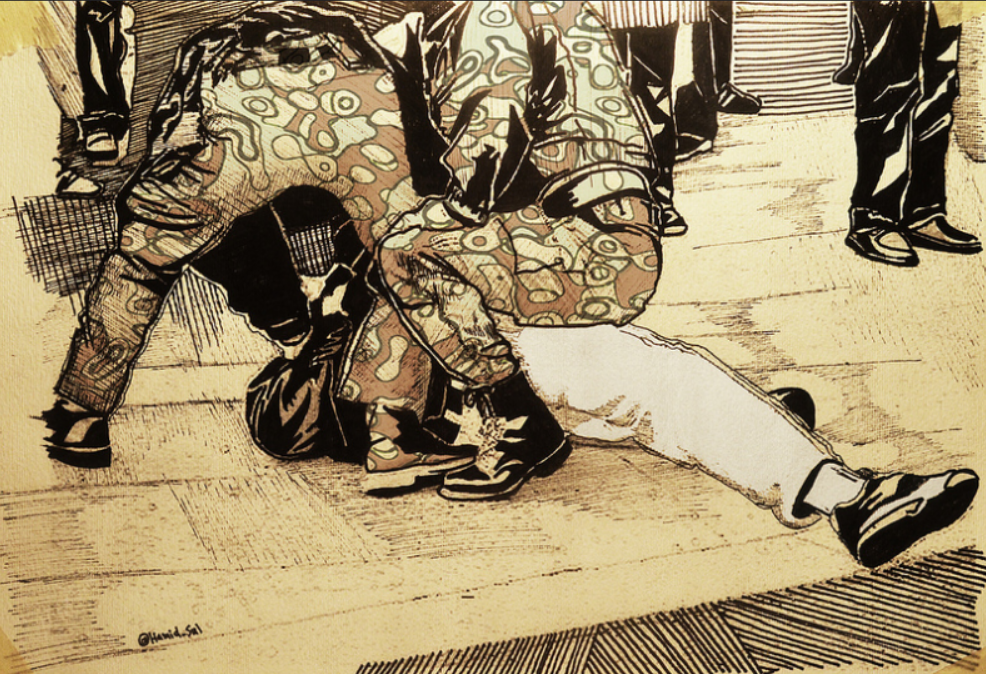Syrian Justice and Accountability Centre

The Syria Justice and Accountability Center works to collect and document cases from different sources concerning the arrests and abductions of Syrian citizens. The center is highlighting some of these cases to demonstrate the systematic nature of these actions, to illustrate the center’s work, and to encourage other victims to testify, given the importance of testimony to any future justice and accountability processes in Syria.
These are excerpts from a testimony of a victim of kidnapping, “M.A.” M.A. was born in 1989 and he works as a tailor.
“My fiancé and I agreed to go to Damascus to get married and then return together to northern Syria. I was on my way there when our public bus lost its way Maraba, in the suburbs of Damascus, and entered Harasta. [We approached] government barriers, where government forces fired into the air to stop the bus. Then, the government soldiers pulled us down [from the bus] and stopped us in the street in a manner suggesting that they would shoot us.”
M.A. continues, telling the details of a story he made up to try to get himself out of trouble, which ended up backfiring:
“I was thinking that those who stopped us were gunmen from the opposition, and that there had been some confusion. I started shouting, trying to explain: ‘I have brothers like you in the Free Syrian Army in the Farouk Brigades!’ The soldiers all went crazy hearing this, and led me to a separate room, screaming into their wireless devices, asking to talk with the Air Force Intelligence branch. Then they started beating me with wooden sticks and batons for a long time.”
Regarding the whereabouts of his arrest, M.A. says:
“They took me to the Air Force Intelligence branch, and then I was blindfolded, but I could hear their conversations. They took me inside to a room that did not exceed about one square meter. I was struck by thirst, and began to request water urgently, but no one answered me. When I started knocking the door firmly, asking for water, they tied up my hands and my feet and took me inside a room with a water pipe. I approached it, crawling, but they put an electric wire in the water, which shocked me [when I tried to drink]. Then someone asked me if I wanted more water. I told him I completely abandoned the idea. ”
Regarding the Air Force Intelligence branch investigation, M.A. says:
“The interrogator asks me why I came to Damascus, so I answer, simply, that I am coming for [my] marriage. He returned me to a room no more than an area of about one square meter, shared with three other detainees. After several hours, they escorted me to a torture chamber where they folded me inside a rubber car tire tied to the ceiling. Then they start to beat me with sticks and electric rods. I was screaming for god’s help, so he [the guard] says: this is God’s stick. And he continued to beat me with it.”
This situation continued for more than a month and a half. Then they took me to a room of about nine square meters, shared with 70 other detainees. I was able to ascertain the number [by observing] the number of meals served and the number of people entering the room.”
Torture was almost daily and very routine, beginning around four in the afternoon and continuing until midnight and, in some cases, until the morning. Among the tools used in torture were the “Magic Carpet” and electrocution [while I was] in many positions, [used] on different body parts. ”
M.A. recalls his observations from that period:
“I have seen with my own eyes many of the deaths under torture. Others were dying inside the detention room due to hunger and lack of food.”
On one occasion, a number of armed elements of the [military] branch escorted me and three others out of the room. Our feet were bound together by chains, so none of us could escape on our own. They asked us to dig nearby. As we were digging, human remains appeared. I saw a full hand and I dug and found other human remains.”
We started digging at midnight and stopped at six in the morning. Then made us put our thumbprint on a blank piece of paper, and returned us to the detention room.”
One night it seemed that there was an armed opposition attack on the Air Force Intelligence branch in Harasta. So the branch soldiers put me and the other detainees in front of them, as a human shield. The other party [the opposition] stopped shooting, but the branch soldiers opened fire on us directly, killing six detainees.”
M.A. reports that he was not fully aware of the details of his kidnapping after he left the Air Force Intelligence branch in Harasta. He was transferred to the Mezze prison and remained there for three days without going to any interrogations or being asked any questions. Then he was transferred to the military police and stayed there a week.
Subsequently he went to the Justice Palace:
“In the Justice Palace in Damascus, one of the judges sentenced me, [saying] that I was a terrorist. I had never met this judge [before].”
M.A. was sent to Adra prison and then released three months later. In total, about eleven months passed between his wedding day and his release.